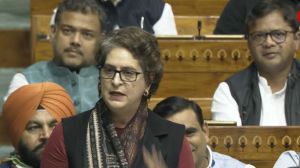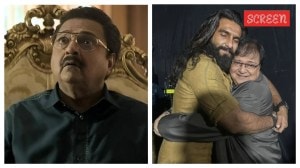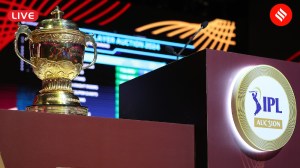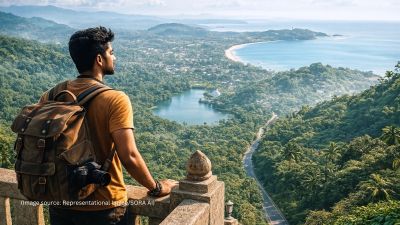Haryana youth dies in Russia, kin say forced to go to Ukraine battlefront
In a communication to the family of Ravi Moun — from Matour village in Kaithal district — the Indian embassy in Moscow confirmed the death although it did not mention the circumstances in which he died.
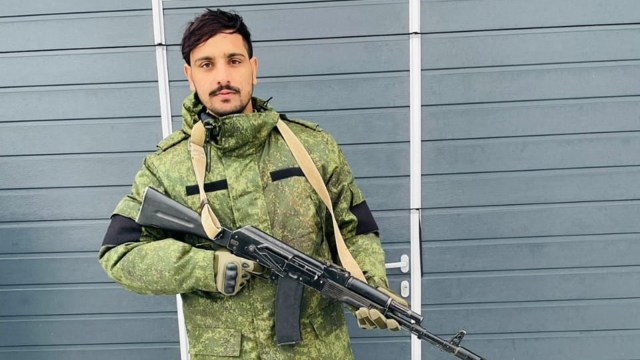 Ravi Moun, 22, from Matour in Kaithal district. (Express Photo)
Ravi Moun, 22, from Matour in Kaithal district. (Express Photo)A 22-year-old man from Haryana has died on the Russian frontline after being “forced to battle against Ukraine forces”, his family members said Sunday.
In a communication to the family of Ravi Moun — from Matour village in Kaithal district — the Indian embassy in Moscow confirmed the death although it did not mention the circumstances in which he died.
Ravi’s elder brother Ajay Moun told The Indian Express that the embassy has sought DNA test reports from the family, especially from Ravi’s mother. “As we have lost our mother, we will be sending the DNA test report of our father to the Indian embassy soon,” said Ajay.
This comes days after Prime Minister Narendra Modi during his meeting with Russian President Vladimir Putin earlier this month raised the issue of Indian nationals working in the Russian military and sought their early release. The Russian side had promised “early discharge of all Indian nationals from the service of the Russian Army”.
The Ministry of External Affairs had in June confirmed the death of two Indians who had been recruited by the Russian Army in the war with Ukraine. One of them was from Amritsar. In March, two more Indian nationals – from Surat and Hyderabad — were killed at the battlefront.
According to Ravi’s family members, he went to Russia in January this year. One among three siblings, including a sister, he had studied up to Class 10.
His brother Ajay said the family spent Rs 11.5 lakh to send Ravi to Russia after selling their one-acre land. According to him, an agent from the village had assured them a transportation job for Ravi in Russia.
“Ravi went on January 13 this year and later five more youths from the village went to Russia. They are still there,” Ajay said.
Ajay claimed that Ravi was inducted into the Russian Army and the family later saw his photos in uniform. He alleged that the Russian Army forced Ravi to go to the frontline to battle the Ukraine forces or face 10 years imprisonment.
According to Ajay, Ravi was given training to dig trenches. “We were in contact with him until March 12. On that day, he told us that he had been on the battlefield since March 6 and he has to go to the battlefield again. After that we lost contact with him,” said Ajay.
On July 21, Ajay sent an email to the Indian embassy in Moscow to enquire about his brother. In response, Gloria Dung Dung, Second Secretary, Embassy of India (Moscow), confirmed Ravi’s death a couple of days later.
“The Embassy had requested the concerned Russian Authorities for confirmation of his death and transportation of his mortal remains as requested by you. The Russian side had confirmed the death. However, to identify the body they need a DNA test from his close relatives, especially a DNA test from his mother,” the embassy wrote.
“As conveyed to you on phone, it is requested that a DNA test may please be done in India from a registered hospital/ government hospital from his mother and the report be shared with the Indian Embassy in Moscow. The report will be shared with concerned Russian Authorities for identification of the body as requested by them.”
Meanwhile, Ravi’s family has urged Prime Minister Modi to assist them in bringing back the body to India as they don’t have enough money.
Reacting to the death, Congress general secretary and Rajya Sabha MP Randeep Singh Surjewala described it “heartbreaking”.
On April 7, Surjewala, who was earlier a legislator from Kaithal, had written to External Affairs Minister S Jaishankar seeking his intervention “in extreme humanitarian crisis for bringing Haryana’s youth from Russia-occupied territory of Ukraine”.
In his letter, Surjewala gave details of six youths from Matour village and two more from Fatehabad and Karnal districts, all in the 19-32 age group.
Surjewala wrote: “On account of rampant unemployment and in absence of any opportunities to find work, these boys were made to pay Rs 8 to Rs 10 lakh each for transportation jobs in Russia. Finally, Ankit, who received the money from the boys and who is already in Russia, took them to Moscow on a tourist visa and forcibly they were sent to the war front in the Russian-Ukrainian war.”



